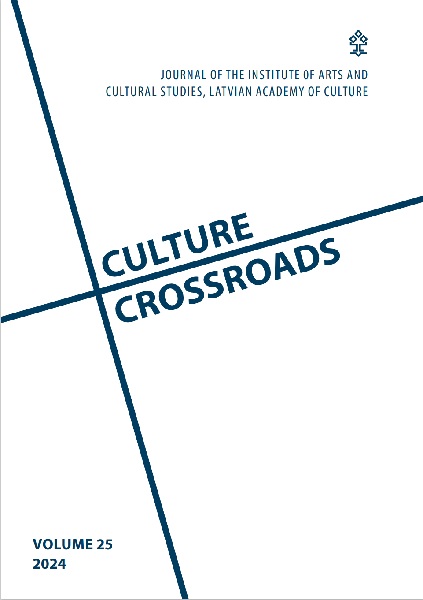MENTORSHIP FOR BUILDING CAPACITY IN THE HIGHER EDUCATION OF THE CULTURAL AND CREATIVE SECTOR
DOI:
https://doi.org/10.55877/cc.vol25.497Keywords:
arts management, CCS, mentorship, education, communities of practiceAbstract
This paper focuses on how mentorship as an integral part of cultural management higher education could enhance meeting the needs of the cultural and creative sector (CCS). As societal changes occur rapidly, there is a need for novel ways to adapt higher education curricula accordingly, ensuring flexibility in educating students to respond to societal needs. We suggest that integrating mentorship into formal education could be one such approach. The research question is: What are the potential roles, benefits and challenges of mentorship in cultural management programmes in terms of knowledge sharing and co-creation? The aim is to explain if and how mentorship could work as a tool in developing the skills and competencies of future forerunners of the sector.
The paper builds on an action research method and applies a qualitative approach to two cases of piloting mentorship programmes. The data collected include observation notes and surveys on interventions in two cultural management master’s programmes. The interventions include mentoring activities, peer-to-peer mentoring and co-creational workshops. As a result, the paper outlines possible approaches and suggestions for how mentorship schemes in the CCS could support the development of capacities to meet the sector’s needs today and in the future. The originality of the paper lies on its novel view of how higher education could build a framework for a new type of solution to address gaps in skills, knowledge, values, and attitudes among professionals through mentorship.
Downloads
References
Amayry, N. A., Crisp, G. (2007). Mentoring Students: Conceptualizing and Validating the Multi-Dimensions of a Support System. Journal of College Student Retention: Research, Theory & Practice. 9(3), pp. 337–356.
Aranburu, I., Ateca, V. M., Dumpe, V., Esteban Galarza, M. S., Jevtić, D., Jyrämä, A., ... & Zemīte, I. (2023). Perspectives on Mentorship–Reinventing Mentoring in Arts and Creative Industries Management. Tallinn: Estonian Academy of Music and Theatre Press.
Brown, J., & Duguid, P. (1991). Organizational Learning and Communities-of-Practice: Toward a Unified View of Working, Learning, and Innovation. Organization Science, 2, pp. 40–57.
Bryant, S. E. (2005). The impact of peer mentoring on organizational knowledge creation and sharing: An empirical study in a software firm. Group & Organization Management, 30(3), pp. 319–338.
Estonian Ministry of Culture (2021). Aruanne “Kultuuripoliitika põhialused aastani 2020 täitmise kohta”. Tallinn. Available: https://www.kul.ee/media/3203/download (viewed 3.05.2022.)
European Commission (2022). Culture and Creativity section. Available: https://culture.ec.europa.eu/et/creative-europe/creative-europe-media-strand/business-cluster (viewed 5.05.2022.)
Goldie, J. (2012). The formation of professional identity in medical students: Considerations for educators. Medical Teacher, 34 (9), pp. 641–648.
Grant-Vallone, E., & Ensher, E. A. (2000). Effects of peer mentoring on types of mentor support, program satisfaction and graduate student stress: A dyadic perspective. Journal of College Student Development, 41(6), pp. 637–642.
Gronhaug, K., and Olson, O. (1999). Action research and knowledge creation: merits and Challenges. Qualitative Market Research, 2 (1), pp. 6–14.
Holian, R. (1999). Doing research in my own organization: ethical dilemmas, hopes and triumphs. Action research international, paper 3 July. Available: www.scu.edu.au.schools/gcm/ar/ari/p-holian99.html (viewed 5.05.2022.)
KEA & PPMI (2019). Research for CULT Committee – Culture and creative sectors in the European Union – key future developments, challenges and opportunities, European Parliament, Policy Department for Structural and Cohesion Policies, Brussels.
Kuznetsova-Bogdanovitsh, K. (2022). Co-Constructing Knowledge Management Practices in Arts Universities. The Role of Entrepreneurial Mindset and Education. Sibelius Academy University of the Arts Helsinki.
Kuznetsova-Bogdanovitsh, K., and Jyrämä, A. (2022). The role of mentorship in universities – the knowledge management framework. Proceedings of the 23rd European Conference on Knowledge Management, 1–2 September 2022 Naples, Italy.
Kuznetsova-Bogdanovitsh, K., and Jyrämä, A. (2023). Knowledge Sharing and Co-Creation Within and Between Academia and Practice. The Role of Diverse Mentorship Practices in the Knowledge Management Framework. In: S. Jyrämä, A. Ranczakowska, K. Kiitsak-Prikk, K. Kiiv (eds). Perspectives on Mentorship – Reinventing Mentoring in Arts and Creative Industries Management. Estonian Academy of Music and Theatre Press, pp. 73–93.
Latvian Academy of Culture (2019). In-depth research of the labor market of cultural and creative industries. Report, LAC.
Lave, J., and Wenger, E. (1991). Situated learning. Legitimate peripheral participation. USA: Cambridge University Press.
Marshall, J. (2001). Self-reflective inquiry practices. In: P. Reason, and H. Bradbury (eds). Handbook of Action Research. Participative inquiry and practice. Sage Publications, pp. 433–439.
Nonaka, I., Konno, N., and Toyama, R. (2001). Emergence of “Ba”: A Conceptual Framework for the Continuous and Self-transcending Process of Knowledge Creation. In: I. Nonaka and T. Nishiguchi (eds). Knowledge Emergence. Social, Technical, and Evolutionary Dimensions of Knowledge Creation. New York: Oxford University Press, pp. 13−29.
Nonaka, I., Toyama, R., & Konno, N. (2000). SECI, Ba and leadership: a unified model of dynamic knowledge creation. Long range planning, 33(1), pp. 5–34.
Nordic Culture Point (2022). Mentorship. Available: https://www.nordiskkulturkontakt.org/en/grants/about-the-grant-programmes/mentorship/ (viewed 3.05.2022.)
Von Krogh, G., and Grand, S. (2000). Justification in Knowledge Creation: Dominant Logic in Management Discourses. In: G. Von Krogh et al. (eds). Knowledge Creation – A source of value. New York: St Martin’s Press.
Von Krogh, G., Ichijo, K., and Nonaka, I. (2000). Enabling Knowledge Creation. How to Unlock the Mystery of Tacit Knowledge and Release the Power of Innovation. New York: Oxford University Press.
VVA et al. (2021). Creative FLIP Final Report, Work Package 2 on Learning. VVA, Goethe-Institute on behalf of Creative FLIP Project, Brussels.
Wadsworth, Y. (1998). What is Participatory Action research? Action research international, Paper 2, November. Available: www.scu.edu.au.schools/gcm/ar/ari/p-ywardsworth98.html (viewed 19.12.2023.)
Wenger, E. (1998). Communities of practice. Learning, meaning, and identity. USA: Cambridge University Press.
Wenger, E. (2000). Communities of Practice and Social learning Systems. Organization, Vol. 7 (2), pp. 225–246.
Downloads
Published
Issue
Section
License
Copyright (c) 2024 Culture Crossroads

This work is licensed under a Creative Commons Attribution 4.0 International License.


